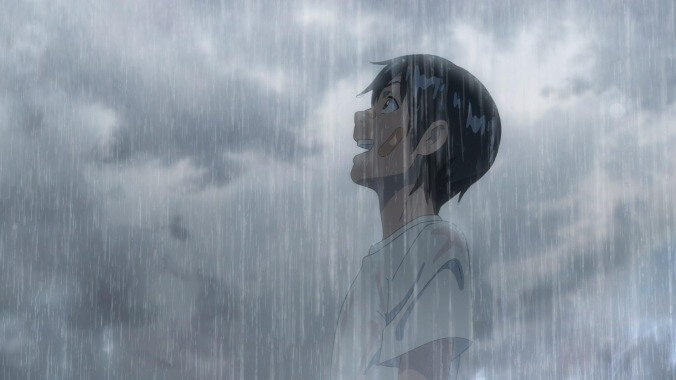Weathering With You director explains why his movie isn't really about fighting climate change
Makoto Shinkai says the film is about young people making a choice for themselves rather than cleaning up a previous generation's mess

[The following contains spoilers for the film Weathering With You.]
Makoto Shinkai’s magical-realist anime drama Weathering With You—one of our favorite films of the first half of 2020—takes place in a near-future Tokyo where it has been raining non-stop for an extended period of time, with people mostly resigned to the fact that it’s going to continue while still crossing their fingers for a rare sunny day. Hodaka, a teenager who runs away to Tokyo to escape his unhappy life in a small town, ends up crossing paths with Hina, an orphan girl who takes care of her younger brother on her own. She later reveals that she’s also a “sunshine girl” who inexplicably has the ability to make the rain stop by praying, but the more she does it, the more her body begins to disappear. The pair eventually discover that Hina is destined to be a human sacrifice and that her death will cause the weather to go back to normal, but after falling in love with each other, they decide that being together in a world besieged by terrifyingly bizarre weather is better than being apart. It’s sweet and sad, and it’s a truly beautiful film.
The central metaphor is obviously climate change, though it could also work as a movie about COVID-19 or governments leaning toward far-right fascism or any number of horrific nightmares that young people have to deal with while growing up, and now Shinkai has penned a lovely essay about what the movie means to him and why critics who said it doesn’t take a clear enough stance against climate change have it wrong. This comes from Collider and was put together in honor of Weathering With You’s one-night-only return to U.S. theaters today, and Shinkai’s basic premise is that his movie isn’t really about convincing young people to fight climate change at all.
It turns out that young people, unsurprisingly, are already very aware that the world—as he puts it—“has turned weird,” and so it would be unfair to force that kind of “righteousness” on a generation that is left to clean up a mess they didn’t make. He sums it up nicely here:
The climate is going haywire. The world is drifting towards exclusionism, and the internet that was supposed to liberate us has become a device for shaming and idiocy, while the ground of Japan is shaking. And as far as I can see, speaking as a middle-aged man, this is what we chose for ourselves.
We didn’t stop it, and that means we chose it. But for the young audience, the people for whom we are supposed to be making films, this is a world in which they never had a choice. Before they could have a say, the world was already going crazy.
Shinkai says that, as a middle-aged person, forcing a story on younger people about how it’s their responsibility to restore “the balance of the world” would be “egoistic and irresponsible.” So, instead, he created Weathering With You as a story about young people making a choice for themselves and finding something worth living for in a world that has already turned weird.
He says he wanted to “depict a couple who will head towards a place of no return, brightly and positively,” and so the movie tries to take an optimistic point of view—not necessarily about climate change, but about humanity and its ability to persevere. It’s a simultaneously haunting and beautiful idea, then, asking people to choose to continue to value love and companionship in the face of impossibly huge terror that could get so much worse before it gets better (if it gets better at all), and it makes Weathering With You arguably one of the most heartbreakingly relevant films of the last decade. Weathering With You is available on HBO Max, and Shinkai’s essay is available at Collider.